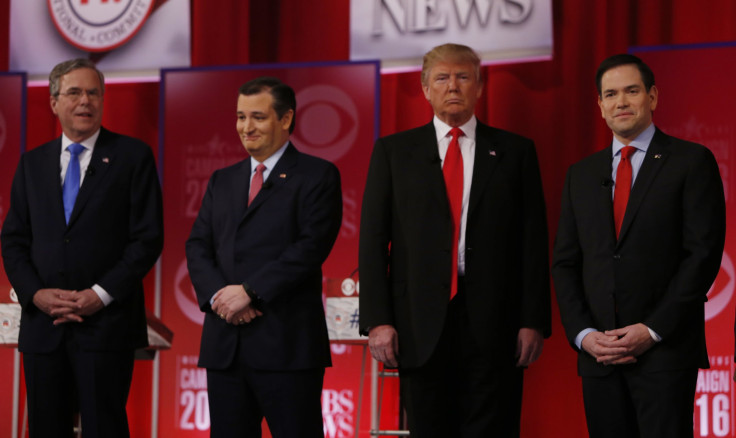CBS Republican Debate Highlights 2016: Best Video Clips, Questions, Insults And Gaffes From Trump And Cruz

The six remaining Republican presidential candidates – including business mogul Donald Trump, Texas Sen. Ted Cruz, Florida Sen. Marco Rubio and former Florida Gov. Jeb Bush -- took to the candidates’ debate stage in Greenville, South Carolina, on Saturday night, after voters in Iowa and New Hampshire weighed in on the race.
Trump came out the clear winner of the New Hampshire primary last week, after winning the last presidential debate and coming in second to Cruz in the Iowa caucus.
But before Saturday’s showdown was underway, the announcement of U.S. Supreme Court Justice Antonin Scalia’s death that afternoon undoubtedly changed the overall tone of the debate. Nearly every candidate weighed in with remembrances of Scalia, a conservative hero on the court, and with statements calling for the justice nomination process to wait until after a new president takes office next January.
That aside, Trump was the man to beat in the upcoming South Carolina primary, scheduled for Feb. 20. The billionaire led his GOP rivals in national and state primary polls. In an Augusta Chronicle, Morris News Service and WAGA-TV poll that surveyed 779 South Carolinian respondents Wednesday and Thursday, 36 percent of likely GOP voters supported Trump. His closest challengers in the poll were Cruz, who garnered 18 percent; and Rubio, who garnered 14 percent. In the same poll, Bush garnered 11 percent, Ohio Gov. John Kasich garnered 9 percent, and retired neurosurgeon Ben Carson garnered 8 percent.
Below, find some of the video highlights of Saturday’s debate:
As expected, the debate began with tributes and remarks about Scalia. The candidates were split on whether President Barack Obama should nominate a new justice before leaving office. Trump said Obama should put forth a nominee, but Republicans in the Senate should delay confirmation.
When you gotta delay #GOPDebate pic.twitter.com/j3KrJuf3yS
— Mic (@micnews) February 14, 2016
But the crowd seemed to turn against Trump for much of the first half of the debate. After his testy exchanges with Bush on issues of foreign policy, including a reference to the Sept. 11, 2001, terror attacks in New York City and Washington, D.C., Trump seemed to lose favor with the audience in Greenville.
"The World Trade Center came down during the reign of George Bush." -- @realDonaldTrump to @JebBush on his ... https://t.co/UGHdLcUjPm
— CBS News (@CBSNews) February 14, 2016
When the debate turned to immigration, an exchange between Cruz and Rubio stood out. As the two sparred over their positions on amnesty for millions of undocumented immigrants in the U.S., Rubio quipped that Cruz's Spanish skills weren't up to par with his. (Both men are of Cuban heritage.)
It got so heated between Cruz and Rubio, there was a Spanish-language challenge #GOPDebate pic.twitter.com/LB5kEQl0gp
— Mashable News (@MashableNews) February 14, 2016
Bush used the debate's immigration segment to remind the audience of Trump's rhetoric targeting Latinos. Last June, when he launched his campaign, the business mogul said Mexicans coming into the country illegally were mostly "criminal" and rapist," drawing sharp criticism from many Hispanic leaders.
"They are not all rapists." -- @JebBush on #immigration, @realDonaldTrump approach #GOPDebate http://cbsn.w... https://t.co/HrKPz1QkmF
— CBS News (@CBSNews) February 14, 2016
Cruz also had harsh words for Trump, who repeatedly interrupted the Texas senator and claimed that Cruz was lying about Trump's record as a businessman.
© Copyright IBTimes 2025. All rights reserved.






















